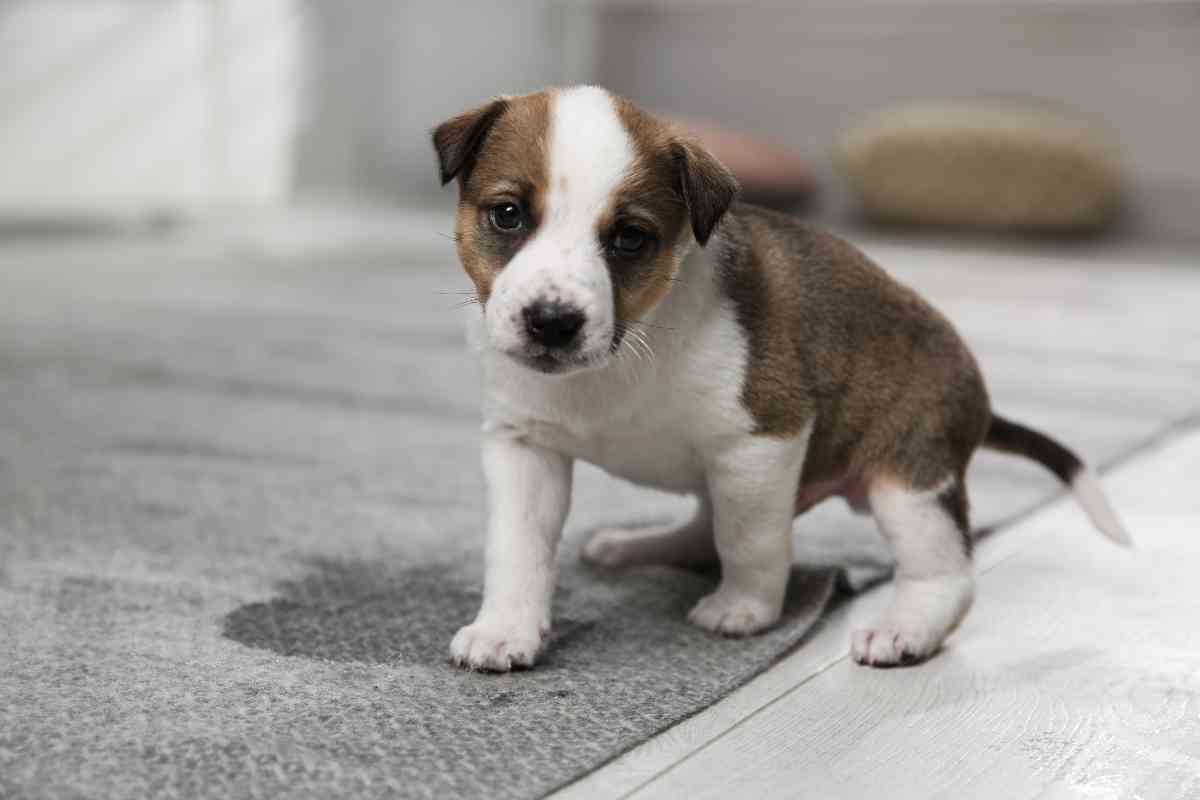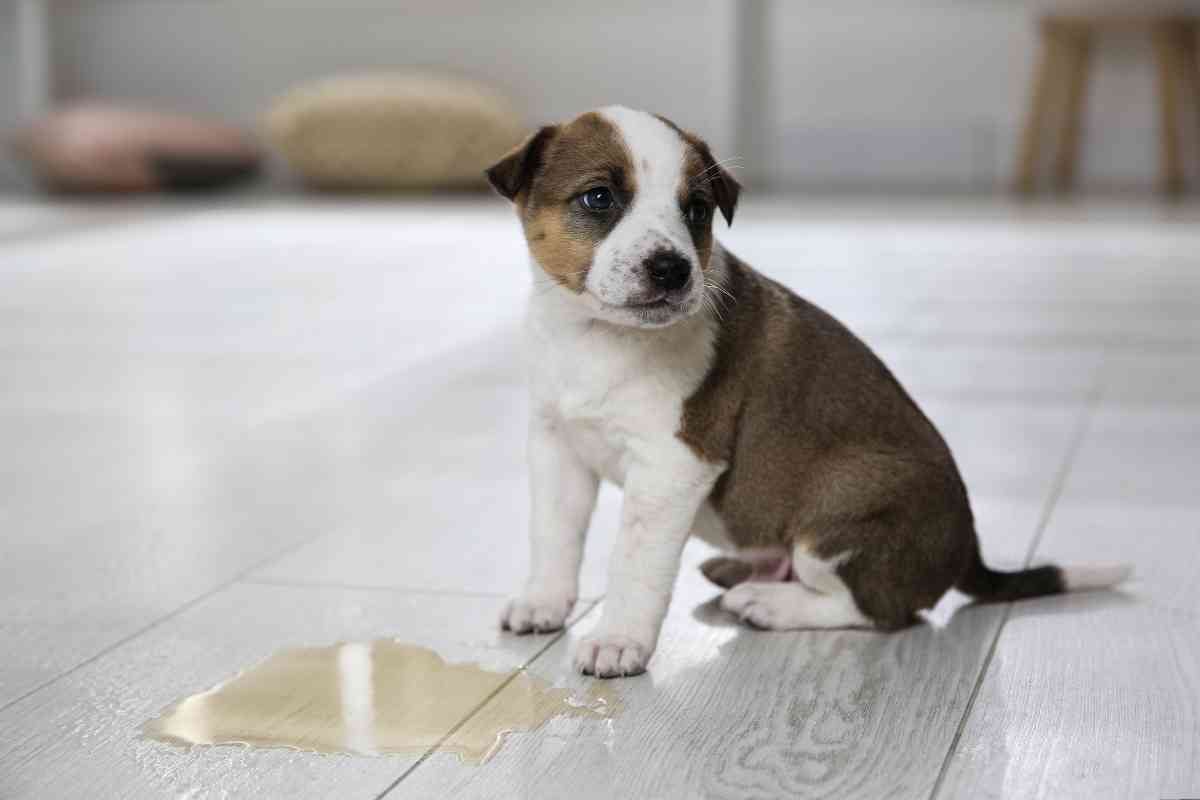6 Reasons Your Puppy Is Regressing In Potty Training
Training your furry friend is a continuous process. However, it may be concerning if your puppy starts regressing in potty training.

Why is my puppy regressing in potty training?
Some reasons your puppy might be regressing in potty training include unrealistic expectations, inconsistency in training, going through the “fear period,” moving through potty training too fast, lacking proper follow-up to their training, or an underlying medical condition.
We researched why some puppies regress in their potty training. We also contacted training and behavioral experts to get their input on the topic and how dog parents can solve the problem. Here are the findings of our research and information from experts.
What is Regression in Potty Training?

Regression in potty training is when your puppy forgets all the potty training that they have already undergone and returns to unrestrained habits of defecating and urinating inside the house.
Yes, we understand that this can be disturbing and inconvenient to go through with your puppy. However, one thing to know is that the dog does not forget potty training intentionally or willingly.
One of the most important things to note here is that the puppy is still young and may forget some of the things they already learned as they continue to grow.
Plus, potty training is not a foreign thing and tends to be common, especially in puppies that are still young.
As they grow, the memories they have will not be as strong as the memories they will form when they are grown, hence the regression.
Reasons Your Puppy May Be Regressing in Potty Training
Given that any training will, in most cases, not result in a straight-line progression, it is also essential to carry the same mentality when potty training your puppy.
It is usual for a puppy to learn 3 steps forward and then take one step back.
Let us look into some of the most common reasons for your puppy’s potty regression.

1. Underlying Medical Condition
It would be best if you took your dog to the vet to be examined to determine whether or not there is an underlying medical condition that makes them urinate or defecate unwillingly.
Here, the vet will best provide you with the right advice for fitting your dog on the steps to take and on the care and medication to solve the problem.
However, if they do not have an underlying medical condition, it might be one of the other reasons stated and explained below.
2. Moving Through Potty Training Too Fast
Potty training any puppy will require time, reinforcement, and a lot of repetition. It would be best if you never were quick to move on to the next cue when training your puppy.
First, you have to ensure that you develop a good level of fluency in whatever you are training them and continually reinforce the new behavior they have learnt over time.
According to experts, sometimes dog parents are excited that their puppy has learned a new cue and rather than taking time to reinforce what they have already learned, they rush to the next cue.
A pet parent must give enough practice time to the puppy to master the cue and for it to sink into their brain before moving to the next cue. This can cause the dog to regress if the cue is never appropriately reinforced.
3. No Follow-Through
Proper follow-through is essential for puppy training, including potty training. Here, there are two main things to keep in mind; routines and consistency. When training your puppy or dog, there is no room to be lax in the training routines.
Pet parents must ensure they incorporate daily routines and reinforce learnt behavior if they do not want their puppy to start exhibiting unwanted habits.

4. Behavioral Changes as Your Puppy Grows
As earlier stated, as your puppy continues to grow, so many things in their body also change.
An excellent example is the changes they undergo in brain chemistry as they go through the different growth stages of puppyhood.
These brain chemistry changes can sometimes bring unwanted behavioral changes, such as a regression in potty training. Just keep in mind that this is something that your puppy has no control over, and when you notice this, the best cause of action is to retrain them.
As a dog parent, you must maintain composure and have a lot of patience to retain the puppy effectively.
Also, you might notice that when you retrain them, they might not take a bit more time to learn things they initially learnt very quickly.
This is to be expected since they are going through physical and emotional, and mental changes.
5. Your Puppy Might Be Going Through The “Fear Period”
Most pet parents know that their puppies will go through this stage when they start socializing, especially between 12 and 14 weeks old.
However, according to behavioral specialists, puppies might go through the second phase of this period later during their development. Sometimes, they can go through a fear period between 6 and 14 months.
Some signs to note are if your puppy is courageous and suddenly starts exhibiting anxiety, insecurity, or other fear-related signs. This can lead to your puppy regressing in potty training.
The best thing a pet parent can do is to continually work on their puppy’s socialization and use positive reinforcement to introduce stimuli to their dog.
If your puppy regression is because of this stage, it will not last long after they get through the period.
6. Abrupt Changes in Your Puppy’s Life
Perhaps one of the most overlooked things is the upheaval and abrupt change that can have on a puppy’s behavior and mannerism, especially when they are still very young.
You must maintain a consistent environment for your puppy as they grow.
Whenever there are significant changes, give your puppy the attention and assurances to ensure they remain grounded and do not start exhibiting unwanted behavior.
How to Help Your Puppy Stop Regressing in Potty Training
Regression in potty training is a common problem many parents have faced. While it can be frustrating to go through with your puppy, it is normal.
The most important thing to remember is that if your puppy is regressing, they are not doing it just for kicks. There is something that is affecting them.
Follow the following steps
- The first thing to determine as a dog parent is what might have caused the change in the behavior.
- Visit a vet to determine if any underlying medical conditions are causing the change.
- Find out other causes and how to deal with them.
- Be patient and encouraging to your puppy. Doing so will make the retraining process take less time, and they will be motivated to achieve your desired results.
- If you cannot figure out the problems or stop the regression, do not be afraid to seek the help of behavioral or dog training experts.
We have outlined reasons they might be regressing and how to handle each scenario. However, if the regression pattern continues, it might be a good idea to seek the help of a behavioral specialist or a dog trainer.
They will be better placed to understand what is causing your dog to regress in their potty training and help you devise ways to solve the problem.
Key Takeaways
- Take your puppy to the vet to determine if any underlying medical conditions are causing the change.
- If no underlying conditions have caused the change, find out the problems and how to deal with them.
- Remember that stopping the regression might take time. So, be patient and encouraging to your puppy.
- Professional help or training might be required to eliminate any unwanted behavior exhibited by your puppy.
- Regression does affect not only puppies but also adult dogs in some cases. Whenever it happens, find the best way to help your dog or puppy.